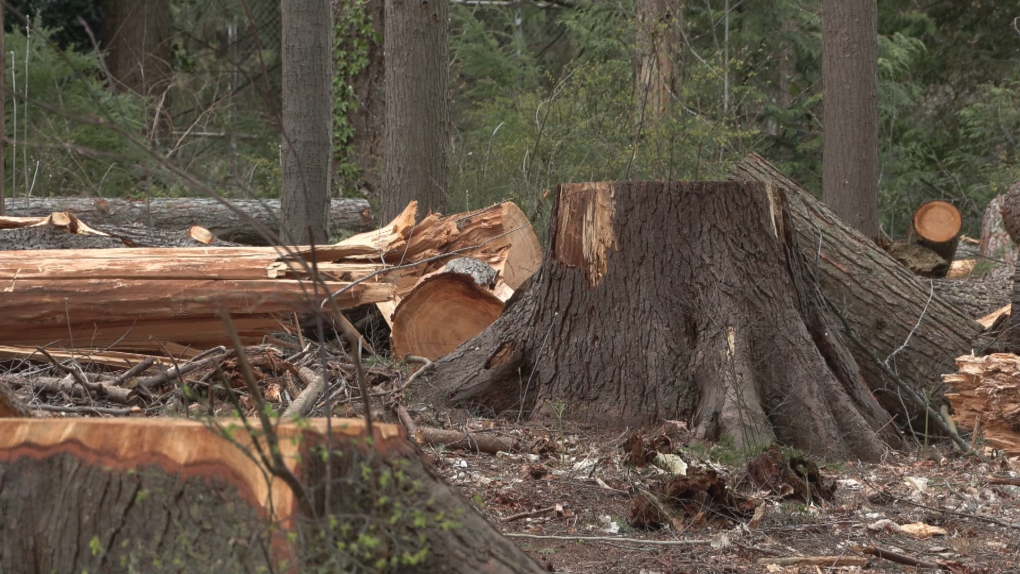Lawsuit challenges Vancouver's decision to remove 160K trees from Stanley Park
 Downed trees, felled due to a looper moth infestation, are seen in Stanley Park in March 2024. (CTV News)
Downed trees, felled due to a looper moth infestation, are seen in Stanley Park in March 2024. (CTV News)
Four Vancouver residents are suing the city over the planned removal of some 160,000 trees from Stanley Park, claiming the massive logging operation is unnecessary.
The Vancouver Board of Parks and Recreation contracted B.A. Blackwell and Associates to begin the felling work last fall, citing concerns that the trees were either dead or dying as a result of an ongoing Western hemlock looper moth infestation – and could eventually pose a risk of toppling onto visitors.
Officials also suggested the affected trees, which make up approximately one-third of the Stanley Park forest, would exacerbate wildfire risks.
But in a lawsuit filed last week in B.C. Supreme Court, a group of residents challenged the science behind the city's justifications.
Michael Caditz, Katherine Caditz, Anita Hansen and Jillian Maguire argued that while the looper moths have damaged hemlocks by feasting on their needles, many of the trees could still recover from the defoliation.
Those that don't are "unlikely to crash down," according to the claim, but could instead be expected to decompose from the top down while standing.
"There is no elevated risk from standing defoliated coastal hemlocks, dead or alive," reads the lawsuit, which was filed on July 11.
The plaintiffs also argued that wildfires are "more likely and more severe" in forests that have been thinned, in part because of larger wind tunnels created by the removal of tree trunks and higher temperatures caused by the decrease in shade coverage from branches and leaves.
The lawsuit identifies Michael Caditz as a software developer, Katherine Caditz as a homemaker, Hansen as a holistic health educator and Maguire as a schoolteacher.
Neither the city nor park board has filed a response to the civil claim, and each declined to comment while it is before the courts.
Logging paused for spring and summer
The logging operation was paused earlier this year to avoid disturbing birds' nests during the spring and summer. Officials expect the work to take five years to complete.
Back in March, the park board toured the tree-clearing progress after several months of felling from B.A. Blackwell – with Commissioner Tom Digby describing the sight as "absolutely devastating."
Digby also noted that the city is planting tens of thousands of new seedlings in a reforestation effort, replacing the moth-prone hemlocks with Douglas fir, cedar and other species.
"The hemlock were doomed species in this space, the hemlock looper always gets them," he said at the time.
In their lawsuit, the Caditzes, Hansen and Maguire each said they visit Stanley Park multiple times per week, and that the logging has already had a number of negative impacts – including a reduction in the sound barrier provided by the trees, increasing noise from vehicles on Stanley Park Drive.
Their claim lists "solitude," "stress relief," "spiritual connection with undisturbed nature" and "rejuvenation" among uses of the park that are being "impeded and degraded" as a result of the tree-clearing.
The plaintiffs also accused officials of failing to properly debate the proposal or consider feedback from the public.
"There was never a motion at a public park board meeting to direct staff to undertake a logging or tree removal operation in Stanley Park with respect to looper moth mitigation," their claim reads.
The group is seeking an injunction prohibiting the further removal of any trees from the park, plus legal costs and any additional relief that "may seem appropriate" to the court.
Michael Caditz also launched a petition opposing the city's plans back in February. As of Tuesday, it had collected more than 18,700 signatures.
CTVNews.ca Top Stories

Prime Minister Trudeau meets Donald Trump at Mar-a-Lago
Prime Minister Justin Trudeau landed in West Palm Beach, Fla., on Friday evening to meet with U.S.-president elect Donald Trump at Mar-a-Lago, sources confirm to CTV News.
'Mayday! Mayday! Mayday!': Details emerge in Boeing 737 incident at Montreal airport
New details suggest that there were communication issues between the pilots of a charter flight and the control tower at Montreal's Mirabel airport when a Boeing 737 made an emergency landing on Wednesday.
Hit man offered $100,000 to kill Montreal crime reporter covering his trial
Political leaders and press freedom groups on Friday were left shell-shocked after Montreal news outlet La Presse revealed that a hit man had offered $100,000 to have one of its crime reporters assassinated.
Questrade lays off undisclosed number of employees
Questrade Financial Group Inc. says it has laid off an undisclosed number of employees to better fit its business strategy.
Cucumbers sold in Ontario, other provinces recalled over possible salmonella contamination
A U.S. company is recalling cucumbers sold in Ontario and other Canadian provinces due to possible salmonella contamination.
Billboard apologizes to Taylor Swift for video snafu
Billboard put together a video of some of Swift's achievements and used a clip from Kanye West's music video for the song 'Famous.'
Musk joins Trump and family for Thanksgiving at Mar-a-Lago
Elon Musk had a seat at the family table for Thanksgiving dinner at Mar-a-Lago, joining President-elect Donald Trump, Melania Trump and their 18-year-old son.
John Herdman resigns as head coach of Toronto FC
John Herdman, embroiled in the drone-spying scandal that has dogged Canada Soccer, has resigned as coach of Toronto FC.
Weekend weather: Parts of Canada could see up to 50 centimetres of snow, wind chills of -40
Winter is less than a month away, but parts of Canada are already projected to see winter-like weather.

































